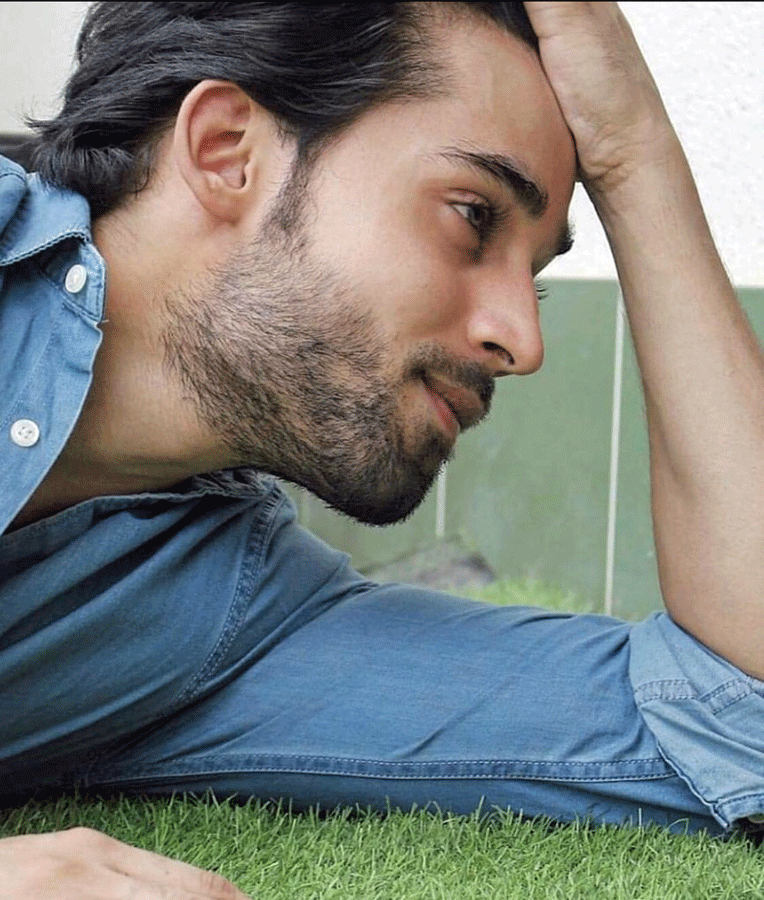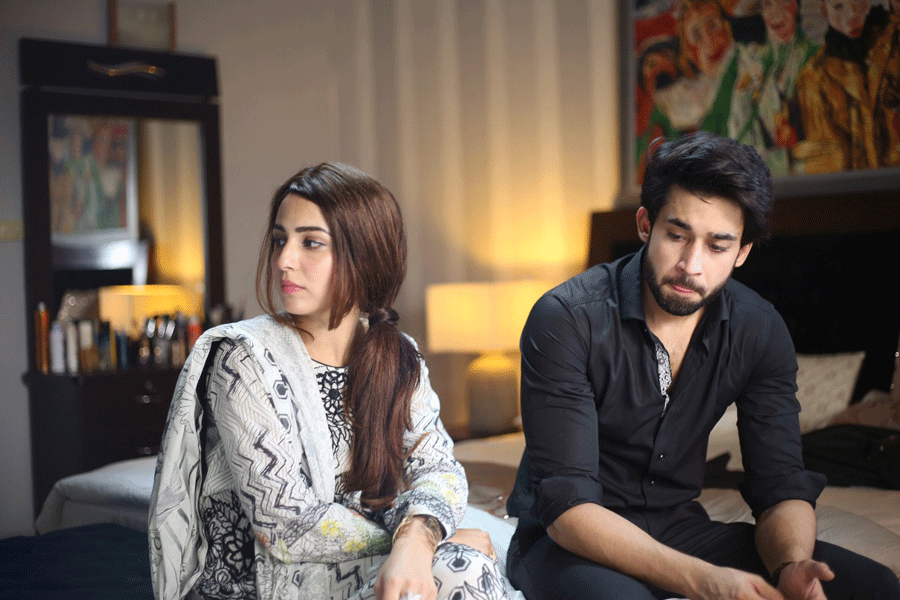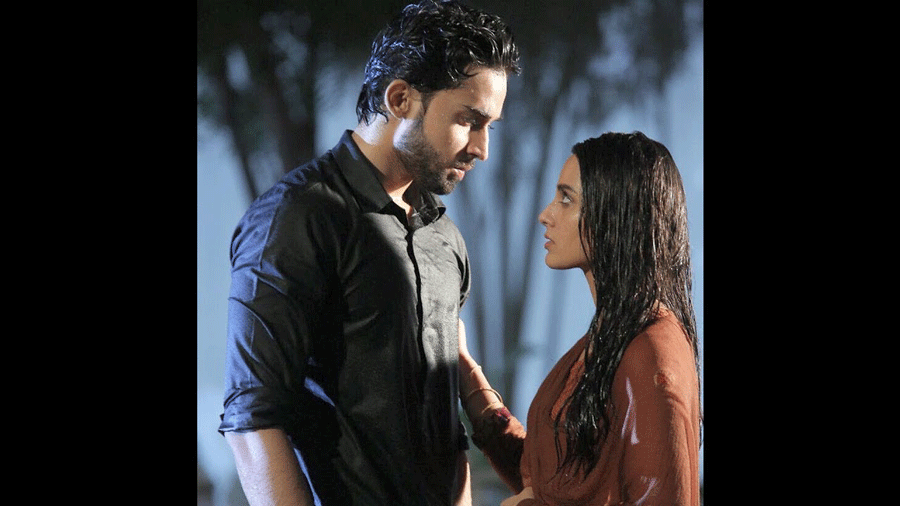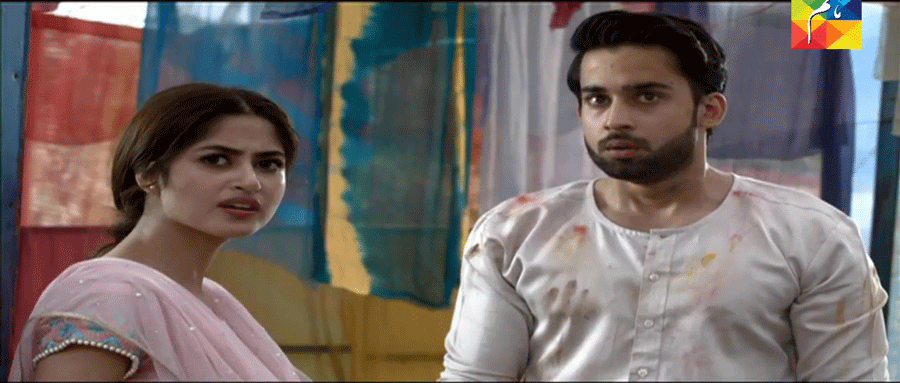“True masculinity is not jeopardised by honest displays of emotion” Bilal Abbas Khan
By Ally Adnan | Interview | Published 6 years ago
A student of drama at the National Academy of Performing Arts (NAPA), Bilal Abbas Khan made his professional acting debut with Hum TV’s Saya-e-Deewar Bhi Nahi in 2016 and, within two years, established himself as a star in the world of show business. The winsome young actor has worked in a number of hugely popular television serials, including Saya-e-Deewar Bhi Nahi, Dumpukht, Saanp Seerhi, Rasm-e-Duniya, O Rangreza, Qurbaan, and, most recently, Balaa, and is one of the most sought-after Pakistani actors today.
In an exclusive interview for Newsline, he talks to Ally Adnan about the world of show business, his rise to success, the Me Too movement, his love for cinema, the importance of friends and family, and more…

You have emerged as one of Pakistan’s most bankable young actors. What factors have contributed to your success as an actor?
I have worked very hard to establish myself as an actor and conducted myself with dignity and professionalism. And I have been very selective in picking the right projects for myself. Additionally, I have received tremendous support from my family and friends. And, most importantly, I have been lucky.
Have your good looks and social standing contributed to your success in show business?
Good looks get you noticed and open a few doors for you, but you need professionalism, dedication, hard work, screen presence and acting talent to make it beyond that point. True, I am blessed with good looks, but the industry is full of better-looking people who have not found the success that has come my way.
Social standing, political clout and financial status can help one secure a couple of projects initially, but at the end of the day this is a business; no production house hires a failed actor a second or third time.
What kind of support, did you receive from your friends and family in establishing yourself as an actor?
My parents did not force me to take on a more conventional career and allowed me to become an actor. I have had my fair share of setbacks and challenges in my showbiz career, but it was the support, prayers and advice of my friends and family that saw me through tough times.
You and Ahad Raza Mir currently hold the mantle of TV’s top young actors. Who is the better actor?
Honestly speaking, I am not the right person to pass judgement. I have my own style of acting – I rely heavily on intuition, instinct and impulse, while performing any character. I stay outside of my character and try to control its behaviour, actions and emotions, from a distance. I am a student of the craft and will continue to keep learning.
I respect how Ahad has positively built his career and wish him the best in his future projects.

What training have you received as an actor?
I studied acting at the National Academy of Performing Arts (NAPA) and worked in a lot of stage plays. It helped me develop my skills and gave me confidence as an actor. NAPA is a great institution and I am glad to have spent time at there.
Virtually all your television serials – Saya-e-Deewar Bhi Nahi, Dumpukht, Saanp Seerhi, Rasm-e-Duniya, O Rangreza, Qurban and Balaa – have been huge hits. Do you worry that you may have to deal with a flop or two, in the near future?
I have not thought about that but a flop would certainly make me sad. I put my heart and soul into my acting projects and it is important for me to see them be successful. Nevertheless, as an adult and a professional, I am aware that everyone has hits and misses in his career. I believe that I can deal with a few setbacks.
My first – and only – feature film, Thora Jee Le, did not do well at the box office and it was not received well critically either. The film’s failure disheartened me, but I bounced back quickly. I don’t think that a flop can hold me down for a long time. In show business, some projects are bound to be successful and some not. It is a fact of the business. I am comfortable with it.
You are currently shooting for Big Bang Entertainment’s Cheekh. What attracted you to the television serial?
Cheekh is being directed by Badar Mehmood. He and I worked very well with each other in Balaa. As a director, he gave me a lot of room to perform well in the serial. When Cheekh was offered to me, I jumped at the opportunity of working with him again. I also loved the script which has been written by the very talented Zanjabeel Asim Shah. And the cast of the serial – Aijazz Aslam, Azekah Daniel, Maira Khan, and Saba Qamar – is wonderful. I am having a great time working with all the wonderful actors, especially Saba Qamar. I admire her both as a person and as an actor. She is a very honest and genuine person and an immensely talented actor. We have not yet begun to realise the depth of her talent. She is one of, if not the, best actors of our time.

Do you plan to do another film?
Yes, I do. I love cinema but I am in no big rush to do films. I will work in films when the right ones are offered to me. In the meantime, I am enjoying working for television.
What kind of films do you watch?
I do not have a favourite genre. My choice of films depends on my mood and state of mind at the time.
I grew up watching Bollywood movies and give them a lot of credit for fostering the love of acting in me. I love the vibrant energy of Bollywood films. I enjoy the songs. However, my taste in cinema has evolved as I have grown older. I prefer Indian parallel cinema to the traditional Bollywood films.
A substantial number of Me Too sexual violation claims are emerging from Bollywood and Hollywood.
What do you think of the Me Too movement?
I think it is the most important movement of the 21st century and it was a long time coming. It is needed to end the pervasive abuse that has become entrenched in society. It is going to change the workplace – and the world – as we know it.
Do you believe that the movement has yielded positive results already?
It has in some ways – primarily by bringing the issue to the forefront and giving victims a voice – but there is still a long way to go.
We need to stop shaming and blaming victims, for starters. And, we need to make sure that we do not support those who are guilty.
How would you like to see the movement evolve?
I would like to see it precipitate the passing of meaningful, effective and enforceable laws. I would like to see it expand to include the abuse of men. And, I would like to see cases play out in courts, instead of the social media.

Do you feel that celebrities, because of their higher profiles, popularity and influence, have a greater social responsibility than other citizens?
Of course, they do. People look up to celebrities, try to emulate their behavior, value their opinions, and take their moral stances seriously. Celebrities can make a positive impact on society by embodying the right values, championing the right causes, and conducting themselves with honesty, honour and dignity. It would be a terrible waste of popularity and influence if celebs did not try to bring about a positive change in society.
Do you enjoy the perks of stardom?
I am a very shy person and do not like a lot of attention. The perks of celebrity come at the cost of one’s privacy and that is not good for someone like me. Of course, it is nice that I make good money and receive a lot of gifts of clothes and accessories. I like the preferential treatment that I get at airports, in restaurants and elsewhere.
Nevertheless, these perks mean a lot less than being recognised as an actor of merit. I am happiest when someone treats me as a competent actor and praises my work.
You are known to be a very sensitive person.
Yes, I am very emotional, and sentimental as well, and do not have a problem demonstrating my feelings. I laugh and cry easily.
Men are not expected to cry in our culture.
Yes, that is true, but I am who I am. I have been brought up to believe that true masculinity is not jeopardised by honest displays of emotions. Our culture and the media celebrate the characteristics of the alpha male, but I find them despicable. Kindness, compassion, selflessness, and intelligence are the true virtues of heroes. Our ethology needs to evolve to value these qualities and shun aggression, anger and bravado.
Has fame made it difficult to make new friends?
I have a very small set of very good friends. They are sincere, loving and a lot of fun.
My circle of friends has not changed since I became an actor. I meet a lot of new people at work and develop cordial relations with all of them, but my friends are the people I grew up with.


